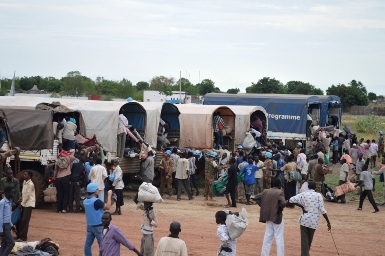UNSC indicates willingness to impose sanctions on S. Sudan
April 24, 2014 (NEW YORK) – The United Nations Security Council (UNSC) said on Thursday it was prepared to consider imposing sanctions on South Sudan’s warring parties if attacks against civilians continues.

The violence has shattered a January ceasefire deal signed between both parties, aimed at ending hostilities which erupted in mid-December last year amid escalating political tensions between president Salva Kiir and his sacked former deputy Riek Machar.
UN peacekeeping chief Hervé Ladsous and UN assistant secretary-general for human rights Ivan Šimonovic briefed the 15-member council on Wednesday on the situation in South Sudan.
In a press statement issued from New York by UNSC president U. Joy Ogwu of Nigeria following the briefing, members said they were willing “to take additional measures should attacks on civilians and violations of the cessation of hostilities agreement continue”.
“The members of the Security Council strongly reiterated their demand for an immediate end to all human rights violations and abuses and violations of international humanitarian law, and expressed their readiness to consider appropriate measures against those responsible,” the statement adds.
Both the US and EU have already threatened South Sudan with sanctions, while French UN ambassador Gerard Araud has indicated that UNSC member states are likely “ready to go down the road of sanctions”.
US-based advocacy group Human Rights Watch (HRW) this week also urged the UNSC to “act decisively” by imposing targeted sanctions on South Sudanese figures connected with human rights abuses.
HORROR AND ANGER
Gruesome images and accounts have emerged from Bentiu after reports emerged that civilians hiding in a local mosque, hospital and church were systematically targeted and executed based on their ethnicity and nationality after pro-Machar rebel forces seized control of the town from government troops loyal to Kiir.
The UNSC has expressed “horror and anger” at the mass violence, which occurred between 14 and 16 April, with women and children also among the casualties.
For the first time since the conflict erupted more than four months ago, hate messages were also broadcast on local radio stations to incite rape and violence.
On 17 April attackers stormed the UN base in Bor targeting civilians mostly of Nuer ethnic origin.
Meanwhile, the UN Mission in South Sudan (UNMISS) said the number of civilians sheltering at its base north of Bentiu had risen from 8,000 to 23,000 following the latest outbreak of violence.
It said its peacekeepers had been involved in extracting hundreds of civilians, who had survived the attacks at the main hospital and the Kali-Ballee Mosque.
CALLS FOR PARTIES TO ACT
The UNSC has reiterated calls for the South Sudanese government to immediately take steps to ensure the safety of all civilians and swiftly investigate the latest incidents.
The members of the UNSC urged South Sudan’s political leaders, including both Kiir and Machar, to “demonstrate leadership by publicly stating that any and all attacks on civilians are unacceptable”, as well as bring those responsible for human rights violations to justice.
The UNSC also expressed grave concerns over threats made to oil installations, petroleum companies and their employees, urging all parties to ensure the security of economic infrastructure.
“The members of the Security Council also called on all parties to respect international human rights law and international humanitarian law, to end intimidation and harassment and verbal attacks against UNMISS, to urgently allow UNMISS to fully implement its mandate, and to refrain from any violence or antagonistic rhetoric directed against UNMISS,” UNSC said in its statement.
In light of recent developments, the UNSC has requested that Šimonovic return to South Sudan to undertake an investigation focused on events in Bentiu and report back to the Security Council.
UNMISS this month also released a human rights report on the situation in South Sudan, while the African Union Commission of Inquiry’s first mission is currently underway in South Sudan, with a report expected within the next three months.
While the South Sudan crisis is considered primarily political, the violence has increasingly taken on an ethnic dimension, with fighting pitting those of Kiir’s Dinka tribe against Machar’s Nuer group.
Ongoing peace talks in the Ethiopian capital, Addis Ababa, being mediated by the Intergovernmental Authority for Development (IGAD) have failed to halt violence on the ground.
Aid agencies have issued sustained warnings that the country is facing a humanitarian catastrophe and a possible famine, but have struggled to raise necessary funds amid donor fatigue and dwindling media interest in the crisis.
(ST)
